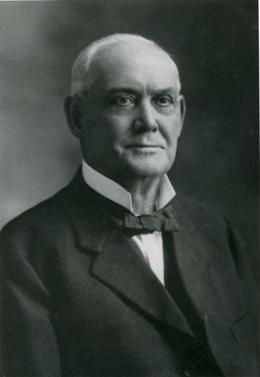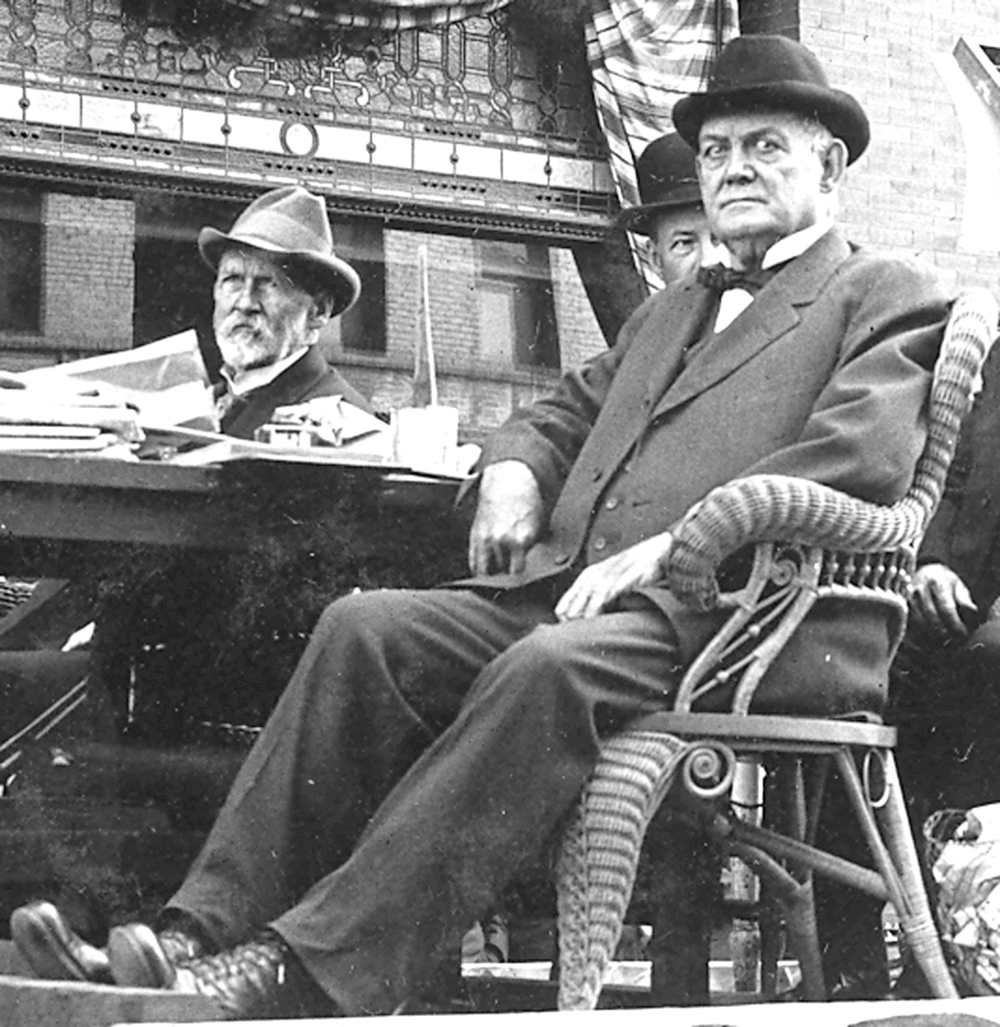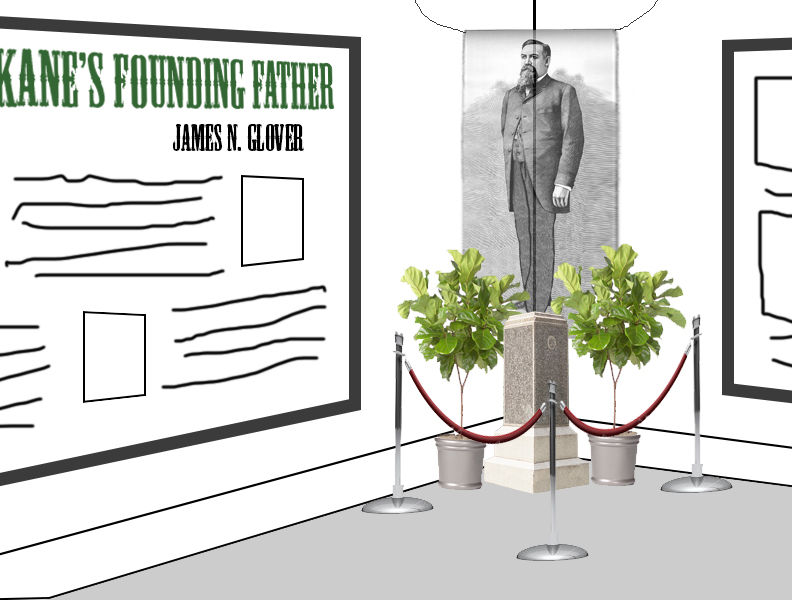Why James Glover deserves Spokane’s gratitude
A recent article by the Pacific Northwest Inlander calls into question whether or not Spokane pioneer and founding father, James Glover, is deserving of having a new plaza next to city hall named in his honor. Lisa Waananen Jones, who wrote the Inlander piece, “Facing History: The story that James Glover didn’t want you to know, and why it’s threatening his legacy,” did a competent job assembling the different parts of the story and deserves added props for doing the research into the story of Spokane. However, noticeably absent from her article is the side of the supporters of the Glover Plaza moniker. In fairness to that side, I’d like to present arguments in favor of honoring someone without whom the city might not even exist.
To her credit, Jones more than adequately detailed the various accomplishments and contributions of James Glover. “[Glover] traveled from Salem, Oregon, by rail, river and saddle with a business partner, Jasper N. Matheny, and they arrived to find a handful of wooden structures among the grass and basalt…He once owned all the land in Spokane’s downtown core, and he spent months in Olympia wooing legislators to establish the county’s boundaries. He laid out the downtown streets and gave them their names…[and] he was the only settler in America who lived to see his land claim turn into a city of 130,000 in less than four decades.”
However, many (if not all) of the article’s interviewees pass judgment upon James Glover without knowing the facts. And I want to stress that I’m not calling attention to these individuals because they failed to diligently research the material; the fact is that nobody knows the facts about James Glover except James Glover and those with whom he closely associated. City Council President Ben Stuckart said he “found out things about James Glover I’m quite frankly not comfortable with…He divorced his wife; she’s buried out at Eastern State Hospital in an unmarked grave. This guy had some sketchy stuff going on in his past.” I doubt that Councilman Stuckart would so quickly and publicly make assumptions about someone’s character if that person were still alive, in good health and ready to defend him or herself at the next council meeting. And I sincerely wish Stuckart would elaborate on the “sketchy stuff” which he cites as reasons for postponing the plaza’s dedication ceremony. It likely wouldn’t take long to unearth some sketchy stuff in anyone’s past if you look long and hard enough.
 Historian Tony Bamonte speculates that Glover was a “domineering man who used his power to banish his wife when she became an inconvenience…His motive was to get rid of her.” It’s an easy charge to level from 100 years in the future. Bamonte implies that Glover cruelly ruined his first wife out of malice or some other wicked intention, when plenty of evidence supports the fact that Susan Glover suffered from some kind of chronic mental illness that worsened with time. I wish they had the kind of treatments available a century ago that they do today. Modern psychological analysis combined with therapeutic and pharmacological treatments could have saved countless lives had they only been around at that time. But the fact is, they weren’t. And no one alive today can testify as to what kind of condition Mrs. Glover was in behind closed doors.
Historian Tony Bamonte speculates that Glover was a “domineering man who used his power to banish his wife when she became an inconvenience…His motive was to get rid of her.” It’s an easy charge to level from 100 years in the future. Bamonte implies that Glover cruelly ruined his first wife out of malice or some other wicked intention, when plenty of evidence supports the fact that Susan Glover suffered from some kind of chronic mental illness that worsened with time. I wish they had the kind of treatments available a century ago that they do today. Modern psychological analysis combined with therapeutic and pharmacological treatments could have saved countless lives had they only been around at that time. But the fact is, they weren’t. And no one alive today can testify as to what kind of condition Mrs. Glover was in behind closed doors.
Is it enough to deny someone who has arguably had the most significant impact on the city of Spokane the honor of having the town’s newest plaza named for him? As I said earlier, the only people who knew the facts about James Glover were James Glover and those with whom he closely associated. Fortunately for us, those associates left us their impressions of the man who’d had such a positive influence on them and their town. Fellow early settler, Joe Daniel, called Glover “the truest pioneer I ever knew.” Edward Pittwood, the city’s first dentist, called Glover “a man of honor, strictly square in his business transactions and more loyal to his friends than any other man I ever knew,” and hotelier W.C. Gray referred to him as “generous to a fault…He thought always of the other person, and had a helping hand always ready to extend.” These are the most accurate descriptions of the man that can possibly be found, and therefore must be considered the closest to the truth.

In her article, Jones posits that “Spokane’s first Mrs. Glover was deliberately snipped out of history — out of spite, embarrassment and ignorance — many years before she was even dead.” If that is the case, Jones’ article provides very little evidence that James Glover took deliberate action to bring eternal anonymity to his ex-wife. The fact that Susan Glover “is notably absent in memories of Spokane’s early days” is more likely due to her lack of memorable contributions to the city, beyond being one of its first residents. Glover did not leave his wife without recompense, as Jones’ article implied. To the contrary, two paragraphs earlier she cites the articles of separation that required Glover “would provide his wife with a carriage, a house in Oregon and $100 a month for the rest of her life.”
James Glover did not force his ex-wife to spend seven years moving “from one downtown apartment to another.” Nor did he direct the hotel proprietor who sold her a house to leave her belongings in the street after she failed to pay for it. Nor did he force the police to incarcerate and eventually commit her after she assaulted an officer who was trying to help. Those would have been deliberate efforts to ruin his ex-wife, and James Glover is not guilty of any of those things.
Let’s be fair. All of us have done things we’re not proud of. Many of us have had rocky relationships that ended with bitterness or spite, and some of us have even felt the urge to act out against our former partners out of a vain sense of justice. Just pick up the paper and you can almost surely find similar stories embroiling everyone from celebrities to the poorest of the poor. Athletes like Tiger Woods or politicians like Bill Clinton; even religious and social leaders like Jesse Jackson and Martin Luther King, Jr. My point is, no one is immune from relationship discord. It doesn’t make us bad people, it just makes us human. And despite his human flaws, James N. Glover was still the primary person responsible for raising a city out of virtually nothing.
EPIBLOG (like an epilogue, get it?): The final few paragraphs in J0nes’ article are spent detailing what remains of an unfinished honor intended for James Glover. Growing up in Spokane, I am regrettably familiar with the area known as Peaceful Valley and what kinds of activities are reputed to take place there. When I was in high school, it had a reputation for being a place where junkies would gather and the homeless would make their camps. It was known for being a haven for burned-out hippies who’d taken one too many bad trips and was even rumored to have a nudist colony residing on the property.
To my amazement, the area is also a place of fascinating historical significance. Until reading the article in the Inlander, I was not aware that it was once known as Glover Field…a place where early residents of the Inland Northwest would gather to watch athletic events. So connected to this site was James Glover, that before his death the people of Spokane decided to erect a statue of him on the grounds and unveiled the granite foundation of said statue at a ceremony nearly a century ago. Jones’ article states “the Advertising Club announced plans to erect a full statue on the granite base so that Glover’s figure could forever look east toward the falls.”
We can only speculate whether it was a lack of funds, interest or organization that led to the statue never being completed. However the granite base still remains, now overgrown with weeds and weathered with age.
I propose the following: Regardless of whether the city decides to name the new plaza after James Glover, the granite statue base in Peaceful Valley remains a significant component of Spokane history. The Eastern Washington State Historical Society – which in 2001 became formally known as the Northwest Museum of Arts and Culture…or The MAC, as they’re more commonly known – should take legal possession of the monument and have it relocated to a quiet corner of the museum. In envisioning this display, I see a large, thick sheet of clear Plexiglas hung above the granite base, etched with the image of James Glover…giving a ghostly appearance to what a statue in his image would have looked like had it been completed. On either side would be displays about his impact on Spokane, telling all sides to his story…including the allegations about his relationship with his first wife.
It would be both a fitting tribute to the man known as the Father of Spokane, and a suitable compromise to those uncomfortable naming city property after him – despite all he had given to make Spokane what it is today.



Additionally, Glover DID NOT lay out the city streets. That was done by Lorenzo Wesley Rima, an accomplished licensed professional surveyor of note. Rima not only performed the very first survey and plat of the city, but also surveyed and platted the nearby town of Spangle, Rima, whose name DOES appear on the original city charter, and was appointed by the Territorial Governor to be a member of the first city council, is a much better example of a founding father of Spokane.
Glover was not the father of spokane.
His name does not even appear on the on the original city charter, nor was he appointed to be a member of the first city council. His infamy as described by Stuckart is accurate.
Bethany – I don’t like your uneducated sounding Opinion. Probably anyone on a Grand Scale has Some Dust in their Corners. The Father of Spokane Needs a Dramatic Place to be, in Appreciation of what he Did for the inhabitants of Spokane – it is Truly His City that we Live in and Enjoy. We Could Elevate his Wife by giving her a Place to be as Well. In order to Balance the Picture – Include her with a Statue Next to his without ALL the incendiary Blah Blah I would like to see his Name Next to City Hall, a Permanent Statue for Glover Field and a Holographic with James & Karen Glover together in the MAC. President Lincoln was Disturbed by his Wife’s Mental Illness and he was away from Home with his Various work so was Not around her as Much but Took care of her and had people to care for her. We don’t know the Nature of Mrs. Glover’s Mental vexation so we Don’t know how it Affected him and his Relationships so we Cannot Judge nor Speculate but their may have been Tremendous Pressure at Times that Complicated a Complex Relationship.
Wow, that’s pretty aggressive. Its always nice to hear other opinions, but going straight to personal attack? That’s a great example of why this country has gotten to the precarious place it is today. I know it’s “tradition” to start flame wars in blog comment threads, but lets try to be a little better than that, okay? Maybe you can weigh in on whether it’s fair to judge the actions of people in the past by today’s “enlightened” standards. Doctors used to recommend cocaine and heroin to people as treatments for various maladies, and today we have an nationwide drug addiction crisis. Do we vilify the medical profession for contributing directly to it? Or do we recognize that they didn’t know any better at the time, and give them the benefit of the doubt that they believed they were helping people?
Uhhhh…Hitler’s dead and can’t defend himself either. An abuser is an abuser is an abuser. Let’s not gloss over this fact seeing you’re a white male wit’ tons o’ privilege.
Nudists! Oh heavens!